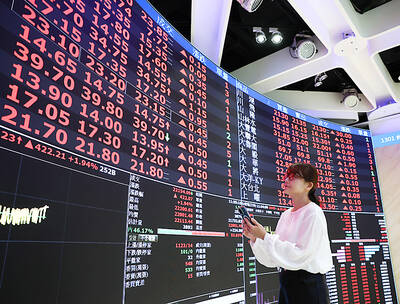The board of Taiwan Cooperative Bank (TCB, 合作金庫銀行) yesterday approved a plan to expand into a financial holding company to boost its operating efficiency, earnings ability and economic scale, the company said in a statement.
The state-run lender, in which the Ministry of Finance holds a 36.83 percent stake, will become the nation’s 16th financial conglomerate once the conversion plan gains approval from the Financial Supervisory Commission.
Taiwan Cooperative will carry out a share swap between the planned financial holding firm and the lender, the Cooperative Asset Management Corp (合庫資產管理) and Taiwan Cooperative Bills Finance Corp (合庫票券), the statement said.
Under the share swap scheme, individual shares in the new financial group may trade for one TCB share, three shares in the fund manager or 3.08 shares in the bills company, the statement said.
All three firms will become subsidiaries of the new conglomerate that will have capital of NT$62.23 billion (US$2.17 billion), the statement said.
The share swaps are to take effect on Dec. 1 providing the regulator gives the go-ahead, the statement said.
Furthermore, Taiwan Cooperative will spin off its brokerage business to pave the way for the establishment of a new securities house with capital of NT$3 billion, the company’s statement said.
The forthcoming financial holding firm will cut its capital by NT$3 billion upon creation, targeted for Dec. 2, according to the statement, adding that the brokerage will then join the group as a subsidiary.
TCB did not comment on whether its joint ventures with French banking group BNP Paribas — the BNP Paribas Assurance TCB Life Insurance Co (合作金庫人壽) and the upcoming BNP Paribas TCB Asset Management Co (合庫巴黎證券投信) — would be under the planned financial holding company.
BNP Paribas TCB Asset Management is to start operations later this month or next month, TCB said.
Meanwhile, TCB is seeking to actively expand in China.
The company’s board yesterday approved plans to sign cooperation agreements with Agricultural Bank of China (中國農業銀行) and China Development Bank (國家開發銀行), according to a separate statement.
The agreements aim to forge substantial cooperative ties between TCB and its Chinese peers, allowing TCB to tap into the Chinese market, the company’s statement said.

UNCERTAINTIES: Exports surged 34.1% and private investment grew 7.03% to outpace expectations in the first half, although US tariffs could stall momentum The Chung-Hua Institution for Economic Research (CIER, 中華經濟研究院) yesterday raised its GDP growth forecast to 3.05 percent this year on a robust first-half performance, but warned that US tariff threats and external uncertainty could stall momentum in the second half of the year. “The first half proved exceptionally strong, allowing room for optimism,” CIER president Lien Hsien-ming (連賢明) said. “But the growth momentum may slow moving forward due to US tariffs.” The tariff threat poses definite downside risks, although the scale of the impact remains unclear given the unpredictability of US President Donald Trump’s policies, Lien said. Despite the headwinds, Taiwan is likely

READY TO BUY: Shortly after Nvidia announced the approval, Chinese firms scrambled to order the H20 GPUs, which the company must send to the US government for approval Nvidia Corp chief executive officer Jensen Huang (黃仁勳) late on Monday said the technology giant has won approval from US President Donald Trump’s administration to sell its advanced H20 graphics processing units (GPUs) used to develop artificial intelligence (AI) to China. The news came in a company blog post late on Monday and Huang also spoke about the coup on China’s state-run China Global Television Network in remarks shown on X. “The US government has assured Nvidia that licenses will be granted, and Nvidia hopes to start deliveries soon,” the post said. “Today, I’m announcing that the US government has approved for us

When Lika Megreladze was a child, life in her native western Georgian region of Guria revolved around tea. Her mother worked for decades as a scientist at the Soviet Union’s Institute of Tea and Subtropical Crops in the village of Anaseuli, Georgia, perfecting cultivation methods for a Georgian tea industry that supplied the bulk of the vast communist state’s brews. “When I was a child, this was only my mum’s workplace. Only later I realized that it was something big,” she said. Now, the institute lies abandoned. Yellowed papers are strewn around its decaying corridors, and a statue of Soviet founder Vladimir Lenin

The National Stabilization Fund (NSF, 國安基金) is to continue supporting local shares, as uncertainties in international politics and the economy could affect Taiwanese industries’ global deployment and corporate profits, as well as affect stock movement and investor confidence, the Ministry of Finance said in a statement yesterday. The NT$500 billion (US$17.1 billion) fund would remain active in the stock market as the US’ tariff measures have not yet been fully finalized, which would drive international capital flows and global supply chain restructuring, the ministry said after the a meeting of the fund’s steering committee. Along with ongoing geopolitical risks and an unfavorable